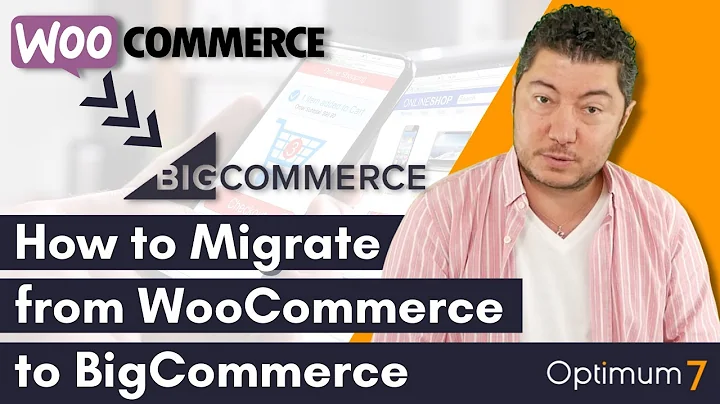Unlock the Power of Shopify Automation
Table of Contents:
- Introduction
- What is Shopify?
- Shopify Automation Explained
- Benefits of Shopify Automation
- Common Misconceptions about Shopify
- Building a Brand on Shopify
- Traffic Sources for Shopify Automation
- The Power of Organic Traffic
- Using Influencers for Shopify Automation
- Pros and Cons of Paid Traffic
- Selling Your Shopify Store
- Making Money with Shopify Automation
- Comparing Shopify Automation to Other Investments
- Conclusion
Article: The Power of Shopify Automation
Introduction
Welcome to the world of Shopify automation! In this article, we'll be exploring what Shopify is and how automation works on this platform. As veterans in the e-commerce industry, we have firsthand experience with running a successful Shopify store and we're here to share our insights with you. So, let's dive in and bust some common myths about Shopify while uncovering the true benefits and potential of automation.
What is Shopify?
First things first, let's clarify what Shopify actually is. Many people have misconceptions about Shopify, thinking it's just another online store. In reality, Shopify is a platform that allows you to build and host your own online store. It's not a specific store itself, but rather a tool for creating your own unique e-commerce website. Understanding this distinction is crucial to grasp the concept of Shopify automation.
Shopify Automation Explained
Shopify automation refers to the process of building and managing online stores on the Shopify platform using automated tools and strategies. It's a recent trend in the e-commerce space, with many entrepreneurs leveraging automation to scale their businesses rapidly. Unlike traditional brick-and-mortar stores, Shopify automation enables you to run your own online business, control your product offerings, and drive targeted traffic to your store.
Benefits of Shopify Automation
So, why choose Shopify automation? The benefits are numerous. One of the key advantages is the ability to scale your business faster compared to other platforms like Facebook or Amazon. With Shopify, you have the freedom to run your own traffic and target specific audiences for your products. However, it's essential to move away from outdated dropshipping models and focus on building a genuine brand. This brings us to the next point.
Building a Brand on Shopify
To succeed in the world of Shopify automation, it's crucial to build a brand around your products. Gone are the days of generic variety stores with random products. Today, customers are looking for niche brands and specialized products. By identifying your target market and creating a brand around it, you'll attract loyal customers who resonate with your vision. For example, our brand, Speed Circuit, focuses on automotive performance products, catering to car enthusiasts and performance-driven individuals.
Traffic Sources for Shopify Automation
Next, let's explore the various traffic sources for Shopify automation. While many people rely on Facebook and Instagram ads to drive sales, there are alternative strategies that can yield higher profit margins. Organic traffic is a powerful tool, and it's something we prioritize in our own Shopify stores. By leveraging influencers and micro-influencers in your niche, you can tap into their audience and generate organic traffic without relying heavily on paid advertising.
The Power of Organic Traffic
Organic traffic allows your brand to thrive in the long run. By focusing on building relationships with influencers, you can establish a strong presence in your niche and attract customers who genuinely resonate with your products. While running Facebook ads may generate more immediate sales, it cuts into your profit margins significantly. In contrast, organic traffic keeps your margins high, resulting in more profitability and sustainability.
Using Influencers for Shopify Automation
To make the most of Shopify automation, we strongly recommend collaborating with influencers in your niche. These influencers can create content and promote your products to their audience, generating both brand awareness and sales. The key here is to select micro-influencers who align with your brand values and have an engaged and loyal following. By leveraging their influence, you can reach a targeted audience that is more likely to convert into sales.
Pros and Cons of Paid Traffic
Although paid traffic can bring immediate results, it's important to weigh the pros and cons before diving in. Running Facebook and Instagram ads can scale your business faster, but it also comes with its drawbacks. The cost of ads eats into your profit margins, and ad fatigue can diminish their effectiveness over time. It's a trade-off between speed and reliability, and choosing the right balance depends on your specific goals and resources.
Selling Your Shopify Store
As your Shopify store grows, you may reach a point where you want to explore other opportunities or cash in on your success. Building a strong brand plays a crucial role in the long-term success of your Shopify store. A well-established brand increases the value of your store, making it an attractive investment for potential buyers. However, without a strong brand and proper brand building strategies, selling your store may not yield significant returns.
Making Money with Shopify Automation
Now, let's get down to the numbers. What can you expect in terms of profitability with Shopify automation? The answer depends on various factors such as the service provider you choose and your own efforts. On average, a well-managed Shopify store can generate around $40,000 to $60,000 in monthly sales. With profit margins of 20%, this translates to a net profit of $8,000 to $12,000 per month. These figures can vary based on your niche, marketing strategies, and overall market conditions.
Comparing Shopify Automation to Other Investments
When considering the potential of Shopify automation, it's essential to compare it to other investment options. For instance, traditional real estate investments may require a substantial upfront capital investment with lower monthly returns. In contrast, a well-managed Shopify store can provide higher monthly returns with a lower initial investment. While every investment has its own risks and rewards, Shopify automation offers an appealing balance of profitability and scalability.
Conclusion
In conclusion, Shopify automation is a powerful tool for building and scaling an online business. By focusing on niche branding, leveraging organic traffic, and collaborating with influencers, you can create a profitable Shopify store with sustainable long-term success. While there are pros and cons to different marketing strategies, finding the right balance between paid and organic traffic is crucial. Make an informed decision, and remember that building a strong brand is key to maximizing your returns. So, get started with Shopify automation and unlock the incredible potential of e-commerce success.
Highlights:
- Shopify automation is a trend in e-commerce that enables rapid business scalability.
- Understanding the distinction between Shopify as a platform and individual stores is crucial.
- Building a strong brand and niche on Shopify is essential for long-term success.
- Organic traffic and leveraging influencers can be more profitable than paid advertising.
- Pros and cons exist with both paid and organic traffic strategies.
- A well-managed Shopify store can generate $40,000 to $60,000 in monthly sales.
- Shopify automation offers high profitability compared to traditional investments like real estate.
FAQ:
Q: How does Shopify automation work?
A: Shopify automation is the process of using tools and strategies to build and manage an online store on the Shopify platform. It involves leveraging automation tools, branding, and targeted traffic to accelerate business growth.
Q: What are the benefits of Shopify automation compared to other e-commerce platforms?
A: Shopify automation allows for faster scalability, the ability to run your own traffic, and increased control over product offerings. It also offers higher profit margins compared to platforms like Facebook or Amazon.
Q: Do I need to build a brand on Shopify?
A: Yes, building a brand is crucial for long-term success on Shopify. Niche branding helps attract loyal customers and establishes credibility in your industry. It also increases the value of your store if you decide to sell it in the future.
Q: Is paid traffic or organic traffic more effective for Shopify automation?
A: Both paid and organic traffic strategies have their pros and cons. Paid traffic can bring immediate results, but it cuts into profit margins. Organic traffic, leveraged through influencers and niche branding, offers higher profit margins and long-term sustainability.
Q: How much money can I make with Shopify automation?
A: The profitability of a Shopify store depends on various factors such as niche selection, marketing strategies, and overall market conditions. However, a well-managed Shopify store can generate monthly sales of $40,000 to $60,000 with profit margins around 20%.


















